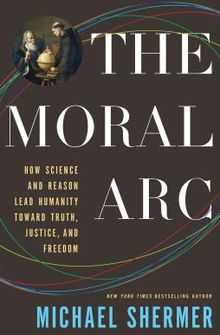The Moral Arc
 How Science Leads Humanity Toward Truth, Justice, and Freedom | |
| Author | Michael Shermer |
|---|---|
| Country | United States |
| Language | English |
| Publisher | Henry Holt and Company |
Publication date | 20 Jan 2015 |
| Media type | Print (Hardcover) |
| Pages | 560 |
| ISBN | 978-0-8050-9691-0 |
The Moral Arc: How Science Leads Humanity Toward Truth, Justice, and Freedom is a 2015 book by Michael Shermer. Steven Pinker describes the book as a sequel to The Better Angels of Our Nature.[1]
Named after the famous quote by Theodore Parker that the arc of the moral universe "is a long one" but "it bends towards justice," Shermer argues that the rise of trade and rise of literacy though the industrial revolution's need for highly educated knowledge workers, has created a "moral Flynn effect"[2] and led to cultures with lower rates of violent crime.[3] Shermer argues that the rise of full democracies around the world, combined with the spread of human rights and civil liberties has led to greater human flourishing.
Shermer criticises historical religious justifications for women being burned alive on suspicion of being witches, the support of slavery, cruelty to animals, mistreatment of women and homophobia,[4] and argues the spread of scientific and Englightened values has created a better foundation for civil society.
External Links
- ReasonTV
- MSNBC interview
- LA Times op ed
- libertarianism.org
See Also
- War Before Civilization
- The Better Angels of Our Nature
- The Rational Optimist: How Prosperity Evolves
References
- ↑ Steven Pinker (16 Jan 2015). "Like Minds: Stephen Pinker Reviews "The Moral Arc"". omnivoracious.com.
- ↑ Michael Shermer (March 2015). "Are We Becoming Morally Smarter?". Reason (magazine).
- ↑ Sally Satel (18 Jan 2015). "Getting Better All the Time".
- ↑ Jake Whitney (15 Feb 2015). "Has Science Made Us Better People?". The Daily Beast.